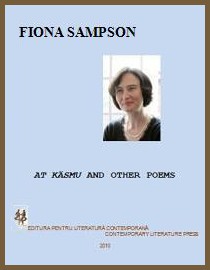At Käsmu and Other Poems
(La Käsmu şi alte poeme)
Fiona Sampson
 |
Translated into Romanian by Brândușa Prepeliță-Răileanu.
|
|
You have to believe poetry can change lives, sometimes.
— Fiona Sampson
Fiona Sampson’s poems in this collection are instances of this poet’s passionate quest for the meaning of the “language you hear/but can't grasp”: the language of the mystery in us and in the world experienced and contemplated, as an extension of one another. The “I” and the “eye”. The rich and imperfect coincidence. The subtle, mature clarity of her poetic utterance lays bare mystery only to suggest its even deeper, insoluble layers. A sense of malaise and distance become a terrain of insight. There is force and vulnerability in her approach, a breathtaking relevance and precision in her vision.
Fiona Sampson’s oeuvre ranges from the infinitesimal nuance with its boundless wealth of meaning to the daring of major themes, considered with poise and sophisticated conceptual and poetic instruments – or to the anguish, the anger, the tragic sense of “our incurable selves”: questioned unswervingly, with unadulterated directness.
As always, Fiona Sampson’s poems are exceptional in their visual, as well as musical quality. Her consummate knowledge of music allows for the sound in her poems to be wonderfully expressive of a world of underlying complexities. The felicitous expression or visual splendour are never an end in themselves, though. There are endless variations in the way in which the poet is inspired to try and capture the sense of the world within/ without. A vast span of references converge into meaning and open up, diverge into new questions of the intelligent mind and alert sensibility.
Fiona Sampson does not accept an easy answer to her questions, whether muted and implicit, or loud and anguished. There is a unique freedom, richness and beauty in these poems – in which we find the author’s recognizable way of displaying the multifaceted reflections of the appearance that bears an elusive, unexpected, paradoxical essence at its core.
Fiona Sampson’s art-and-craft of poetry is at its finest, in this superb collection of verse.
Ioana Ieronim
Fiona Sampson’s text is a universe. It encompasses words (many other poets’ poems are rewritten in this one), emotions (usually cryptic, encoded in perfect ‘objective correlatives’), geography, philosophy (of love postponed, of how to bear the too late or the irretrievable when they happen). This text is and is not about love. Sampson’s love is a tantalizing might-be, the spectre of the soon to become might-have-been.
This subtle play upon the (verbal, enduring) unreality of (painfully transitory, rendingly mortal) reality is what differentiates it brutally from someone like T.S. Eliot, from the generation of Modernism.
She uses all the tricks ever (from the deeply emotional stream of consciousness in her text to a very contemporary laconic dryness), and writes a composite of all times. Gun in hand – possibly well hidden in the folds of her magic sensibility, she hunts down all possibilities of poetry, and this is what makes her poem unforgettable. She haunts the reader long after the poem has been read precisely because she pushes the frontier of poetry into the wild west of psychology. She writes a poetic psychology of the longing self.
She utterly defamiliarizes whatever she formulates. Her poems are a wonderful wait, but they are nobody’s home: the reader is cut to the quick, he needs air and bolts back into his uninteresting, everyday world, devoid of intensity as it is. Sampson’s intensity is not inhabitable: it is like a scalpel that cuts a living body. In order to be poetic, you have to be cruel: this is her technique.
Lidia Vianu
Please click on the link below to see the book. Alternatively, you can right-click and choose "Save Link as..." to download it in .pdf format.
Fiona Sampson: At Käsmu and Other Poems (La Käsmu şi alte poeme)
